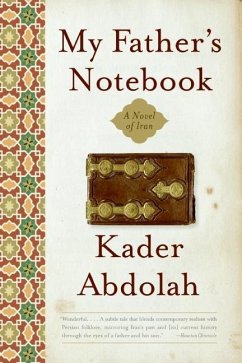On a holy mountain in the depths of Persia there is a cave with a mysterious cuneiform carving deep inside it. Aga Akbar, a deaf-mute boy from the mountain, develops his own private script from these symbols and writes passionately of his life, his family and his efforts to make sense of the changes the twentieth century brings to his country. Exiled in Holland a generation later, Akbar's son Ishmael struggles to decipher the notebook, reflecting how his own political activities have forced him to flee his country and abandon his family. As he gets closer to the heart of his father's story, he unravels the intricate tale of how the silent world of a village carpet-mender was forced to give way to one where the increasingly hostile environment of modern Iran has brought the family both love and sacrifice.
When he was a boy, Aga Akbar, the deaf-mute illegitimate son of a Persian nobleman, traveled with his uncle to a cave on nearby Saffron Mountain. Once there, he was to copy a three-thousand-year-old cuneiform inscription-an order of the first king of Persia-as a means of freeing himself from his emotional confinement. For the remainder of his life, Aga Akbar used these cuneiform characters to fill a notebook with writings only he could understand. Years later, his son, Ishmael-a political dissident in exile-is attempting to translate the notebook . . . and in the process tells his father's story, his own, and the story of twentieth-century Iran.
A stunning and ambitious novel by a singular literary talent, My Father's Notebook is at once a masterful chronicle of a culture's troubled voyage into modernity and the poignant, timeless tale of a son's enduring love.
Hinweis: Dieser Artikel kann nur an eine deutsche Lieferadresse ausgeliefert werden.
When he was a boy, Aga Akbar, the deaf-mute illegitimate son of a Persian nobleman, traveled with his uncle to a cave on nearby Saffron Mountain. Once there, he was to copy a three-thousand-year-old cuneiform inscription-an order of the first king of Persia-as a means of freeing himself from his emotional confinement. For the remainder of his life, Aga Akbar used these cuneiform characters to fill a notebook with writings only he could understand. Years later, his son, Ishmael-a political dissident in exile-is attempting to translate the notebook . . . and in the process tells his father's story, his own, and the story of twentieth-century Iran.
A stunning and ambitious novel by a singular literary talent, My Father's Notebook is at once a masterful chronicle of a culture's troubled voyage into modernity and the poignant, timeless tale of a son's enduring love.
Hinweis: Dieser Artikel kann nur an eine deutsche Lieferadresse ausgeliefert werden.








